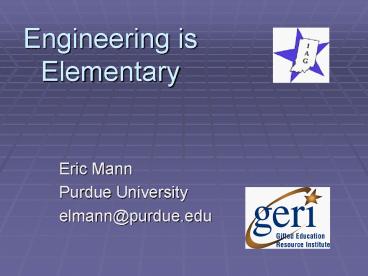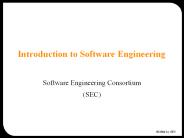Engineering is Elementary - PowerPoint PPT Presentation
1 / 37
Title: Engineering is Elementary
1
Engineering is Elementary
- Eric Mann
- Purdue University
- elmann_at_purdue.edu
2
Children are born engineers
3
Children are born engineers
- They are fascinated with building, and with
taking things apart to see how they work. By
encouraging these explorations in elementary
school, we can keep these interests alive.
Describing their activities as engineering when
they are engaged in the natural design process
can help them develop positive associations with
engineering, and increase their desire to pursue
such activities in the future.
4
Makes math and science relevant Integrates other
disciplines
- Engineering projects integrate other disciplines.
Engaging students in hands-on, real-world
engineering experiences can enliven math and
science and other content areas and motivate
students to learn math and science concepts by
illustrating relevant applications.
5
Interdisciplinary
- Science The process of inquiring into the
attempt to make observations, develop
explanations for what is observed, and test these
ideas by making predictions and comparing them to
what happens in new situations.
Science
Engineering A problem-solving process (called
the Engineering Design Process) that can be
described as Ask, Imagine, Plan, Create, and
Improve.
Technology
Engineering
Technology Any thing or process that humans
create or use to solve a problem or meet a need.
6
Engineering Fosters Problem-Solving Skills
- Problem solving
- Analysis and data-driven decisions
- Variables and optimization
- Teamwork
- Creativity
- Communication
conduct experiments, examine scientific data,
etc.
To design or improve a technology.
and test using controlled scientific
experimentation
7
Parallels between P-12 Engineering Education and
Gifted Education
- Creativity ? Challenge
- Problem Solving ? Interdisciplinary
- Critical Thinking ? Real-World
Applications - Students exchange traditional roles as
lesson-learners and doers-of-exercises for more
challenging and demanding roles that require
hands-on learning, first-hand investigations, and
the application of knowledge and thinking skills
to complex problems.
8
Why Elementary Engineering?
- Technological literacy is a basic 21st century
literacy - But childrens perceptions
9
Engineers.Build bridges, buildings, and roads
10
(No Transcript)
11
Engineers.Fix cars, engines, and machines
12
(No Transcript)
13
Engineers.Use or fix computers
14
Engineers.Drive trains
15
(No Transcript)
16
(No Transcript)
17
(No Transcript)
18
(No Transcript)
19
Engineering is Elementary (EiE)
- Lessons that integrate engineering and technology
concepts into elementary science. - Goal 1. Increase childrens level of
technological literacy - Goal 2. Increase elementary teachers
understanding of technology and engineering and
their abilities to teach these subjects to their
students - Goal 3. Modify the U.S. system of education to
include engineering at the elementary level.
20
Goal 1. Increase children's technological literacy
- Knowledge (Know about)
- What engineering and technology are and what
engineers do - Various fields of engineering
- Nearly everything in the human world has been
touched by engineering - Engineering problems have multiple solutions
- How society influences and is influenced by
engineering - How technology affects the world (both positively
and negatively) - Engineers are from all races, ethnicities, and
genders - Skills/Experience (Be able to do)
- Apply the engineering design process
- Apply science and math in engineering
- Employ creativity and careful thinking to solve
problems - Envision one's own abilities as an engineer
- Troubleshoot and learn from failure
- Understand the central role of materials and
their properties in engineering solutions
21
Engineering is Elementary (EiE)Boston Museum of
Science
- EiE is creating research-based, classroom-tested
curricular materials that integrate engineering
and technology concepts and skills with
elementary science lessons. Each unit integrates
an elementary school science topic with a
specific field of engineering. - EiE curricular materials are used by over 2,000
teachers and 50,000 students in 39 states. - EiE students were significantly more likely to
correctly identify what engineers do and what
technology is when compared with control students
(n 5,139 EiE students and n 1,827 control
students). - EiE students also showed significant improvements
on their understanding of EiE unit-specific
science and engineering concepts. (n 247 EiE
students)
22
Curricular Resources
- Each EiE unit contains
- Storybook
- Lesson
Plans -
Duplication Masters (2 levels) - Assessment
Items - Background
Information for
the Teacher - Connected to Existing Science Curriculum
- each unit is mapped to units developed by FOSS,
GEMS, Insights, and STC - includes a list of the major science concepts
that are reinforced within each lesson
23
Unit Design
Lesson 1 Engineering Story (Literacy
Connections) Lesson 2 A Broader View of an
Engineering Field Lesson 3 Scientific Data
Inform Engineering Design Lesson 4 Engineering
Design Challenge has influenced me in how I
see and understand the connection of engineering
to math and science. I feel that I can
distinguish the roles of these jobs in the real
world much more successfully to my students .
24
- Water, Water Everywhere Designing Water Filters
- Science Topic Water and the Water Cycle
- Engineering Field Environmental Engineering
- Country India
- Storybook Saving Salila's Turtle
- This unit addresses the increasingly important
issue of water quality through lessons that teach
students about water contamination and the ways
that people ensure the quality of their drinking
water. - Students will first think like environmental
engineers as they review a mural of a small
American community, noting possible sources of
pollution and suggesting ways to clean up or
eliminate the source of the pollution. Students
will then focus on the environmental engineering
problem of providing safe drinking water as they
plan, construct, test, and improve their own
water filters. - FOSS Connection WaterSTC Connection Land and
WaterGEMS Connections Acid Rain, Involving
Dissolving, Liquid Explorations, River
CuttersInsights Connections Liquids, There is
No Away
25
(No Transcript)
26
(No Transcript)
27
(No Transcript)
28
(No Transcript)
29
(No Transcript)
30
(No Transcript)
31
(No Transcript)
32
(No Transcript)
33
- "When I first started this project and I saw the
word "engineering", I thought "oh boy- I don't
know anything about that. How can I teach it to
my kids?" Now I realize that I was already doing
so much teaching that included many of those same
ideas like with our science and math units and
even social studies." 2nd grade teacher
34
- "The stories are easy to follow and include both
the science and engineering ideas and activities
that the children are learning about. They are so
delighted when they find themselves doing the
same activities that the book character does!"
35
Because Dreams Need Doing!
- No profession unleashes the spirit of innovation
like engineering. From research to real-world
applications, engineers constantly discover how
to improve our lives by creating bold new
solutions that connect science to life in
unexpected, forward-thinking ways. Few
professions turn so many ideas into so many
realities. Few have such a direct and positive
effect on peoples everyday lives. We are
counting on engineers and their imaginations to
help us meet the needs of the 21stcentury. - Baranowski, M. Delorey, J. (2007) Because
dreams need doing New messages for enhancing
public understanding
36
Innovations in P-12 sTEm Education
- Aligned with national initiatives focused on STEM
education, with an emphasis on technology and
engineering fields. - Jointly the Colleges of Education, Engineering
and Technology are - Conducting research to discover how young
children learn and engage in sTEm, and how
employing experiential practices, problem solving
skills, and design can enhance learning - Developing in-service and pre-service teacher
preparation programs in P12 engineering and
technology - Developing relevant, authentic, and
standards-based P12 curriculum around the
concepts of engineering artifacts, experience,
and design - Assessing student learning of engineering and
technology concepts in the P-12 environment - http//www.education.purdue.edu/stem/
37
- This not a complete list but rather a
starting point for you to explore options for
getting your students involved in engineering and
technology. - Elementary
- Engineering is Elementary http//www.mos.org/eie/
- Invention-Innovation-Inquiry Units for
Technological Literacy, Grades 5-6
http//www.iteaconnect.org/i3/index.htm - Partnerships Implementing Engineering Education
http//www.wpi.edu/Academics/PIEE/Resources/less
ons.html - Middle School
- Gateway to Technologies http//www.pltw.org/curr
iculum/ms-engineering.html - Learning by Design http//www.cc.gatech.edu/pro
jects/lbd/home.html - More Information/Resources
- American Society for Engineering Education K-12
Center http//www.engineeringk12.org/ - Engineering Pathways - National Science Digital
Library http//www.engineeringpathway.com/ep/inde
x.jhtml - International Technology Education Association
http//www.iteaconnect.org/ - Innovations in P-12 sTEm Education
http//www.education.purdue.edu/stem/ - Teachers Domain-Engineering http//www.teachersdo
main.org/sci/engin/index.html - TEACH Engineering K-12 Resource Center National
Science Digital Library http//www.teachengineerin
g.org/index.php































